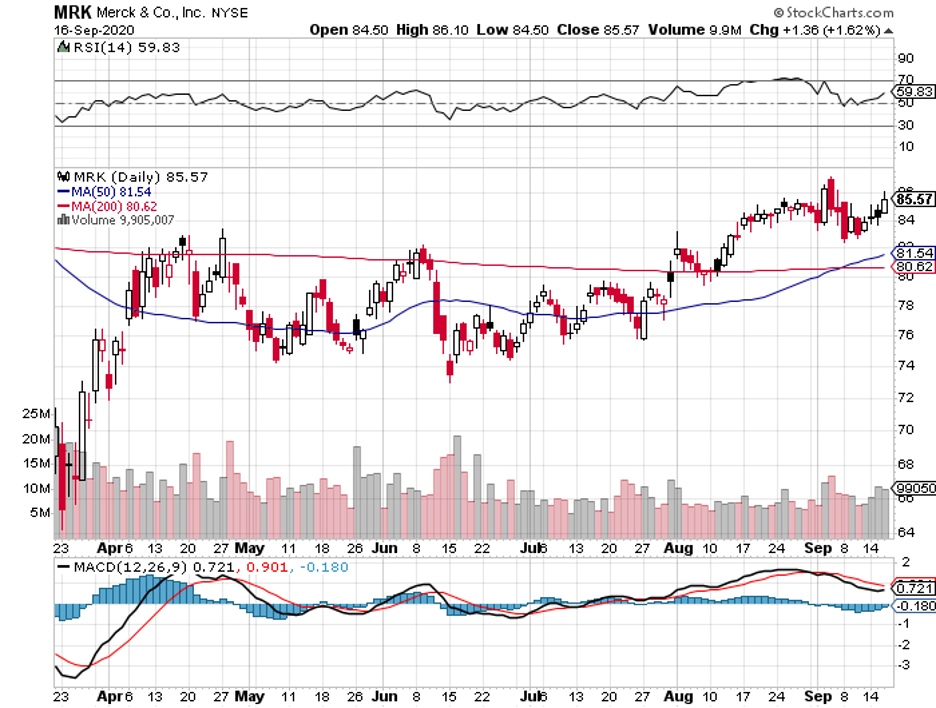Why Merck is Underappreciated in the COVID-19 Race?
The excitement over the COVID-19 vaccine candidates has boosted the shares of the most widely reported companies like Pfizer (PFE) and Moderna (MRNA). Meanwhile, other developers have not received the same love from investors.
However, it looks like another COVID-19 vaccine player will be joining Pfizer and Moderna under the spotlight: Merck (MRK).
Merck recently announced that it is now ready to test its vaccine on humans. The trials will be conducted in Germany, and the company has been scouring government databases for viable volunteers.
Unlike Pfizer and Moderna, which are utilizing a novel technology that will need two vaccine doses to be fully effective, Merck is working on two different COVID-19 vaccine candidates designed to work with only a single dose.
This could offer Merck a clear advantage over its competitors.
Also, one of Merck’s candidates could be taken in oral form. This is another significant advantage since it would make the vaccine easier and more convenient to administer.
Merck’s vaccine candidates contain a destabilized version of the same virus that causes measles. This virus is then used to deliver the coronavirus’ spike protein to the patient’s immune system, which would trigger an immune response.
The goal is not only to create a vaccine that would offer protection using a single dose, but also utilizing an existing and reliable technology that can be readily scaled up for mass production.
Since we need to immunize roughly 7 billion across the globe, Merck’s plan to manufacture a single-dose vaccine would be more convenient instead of using multiple doses.
Overall, the COVID-19 vaccine market could reach $50 billion in revenue by 2030.
Apart from its vaccine candidate, Merck is also looking into an antiviral treatment for COVID-19 patients
If successful, this product would be competing against Gilead Sciences’ (GILD) Remdesivir. Just like one of its vaccines, Merck is also developing a treatment in oral form instead of a hospital infusion.
Merck’s Remdesivir alternative can reduce the severity of the COVID-19 by interrupting the virus’s capacity to replicate.
Unlike Gilead’s drug, which can only be used in severe cases, Merck’s candidate can be prescribed immediately after a patient is diagnosed with the disease.
This COVID-19 cure is set to begin its Phase 3 trial this September, with Merck is confident that it can manufacture millions of doses before 2020 ends.
Experts dubbed this drug as an “underappreciated COVID-19 treatment,” which is estimated to reach blockbuster status.
Aside from not getting enough credit for its COVID-19 efforts, Merck is also not receiving enough attention for its pipeline.
So far, the company holds the leading drug that boosts the immune system to fight off cancer: Keytruda. It also has one of the leading vaccine franchises in the world.
Keytruda can easily generate $14.5 billion in sales in 2020 alone, which represents a 30% jump from its 2019 performance. More importantly, the drug can reach $22 billion by 2025.
However, investors are worried over Merck’s dependence on the drug, which comprises 30% of its revenue. In fact, Wall Street keeps zeroing in on the 2028 patent expiration of Keytruda.
At the moment, Keytruda faces competitors like Roche Holding (RHHBY), Regeneron Pharmaceuticals (REGN), and Bristol Myers Squibb (BMY).
However, Merck is not the type to put all its eggs in a single basket.
The company is developing new products that can generate an additional $13 billion to $18 billion in sales annually.
Among these treatments is another potential immuno-oncology antibody, which has been sent to clinical trials this year. Merck also has a long-term HIV treatment queued for clinical studies.
One exciting drug candidate is ARQ531, which is a potential cancer therapy. This projected blockbuster was part of Merck’s $2.7 billion acquisition of ArQule in January.
Other than this acquisition, Merck also obtained the rights to several cancer treatments, which are hailed to be more effective than the conventional chemotherapy, thanks to its acquisitions of Astex Pharmaceuticals and Taiho Pharmaceuticals.
In terms of its vaccine franchise, this arm of the business is projected to generate $9 billion in annual sales in 2021, with the revenue steadily rising to $100 billion in the next several years.
In particular, Merck is looking into developing further its cervical cancer vaccine Gardasil. So far, this vaccine is estimated to generate roughly $3.9 billion in sales in 2020 and reach $5.5 in 2023.
The focus on boosting its vaccine franchise is a strategic move considering that vaccines are generally a durable business and are typically immune from any generic competition.
Although it is not one of the leading vaccine developers in the COVID-19 race, Merck has positioned itself as the leader in the cancer drug development sector and its distribution over at least the next decade.
I believe that Merck’s prudent business, strategic acquisitions, and exciting pipeline will gradually push the stock to the top.
In summary, I think that Merck is a good stock to buy. For those searching for a strong biopharmaceutical play at a reasonable price, this company should be on your shortlist.

